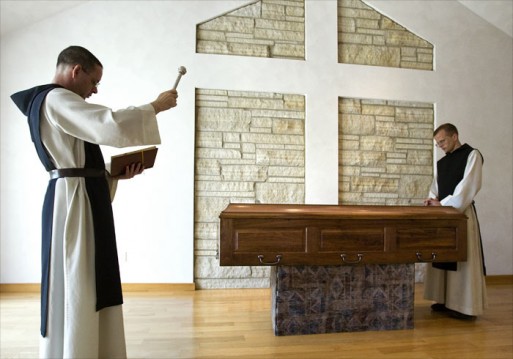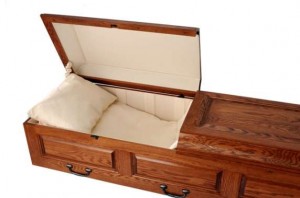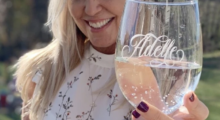Trappist Caskets is a unique business, producing simple, elegant, ecologically minded caskets from company headquarters in Peosta, Iowa — which happens to be New Melleray Abbey, home of Catholic monks known as Cistercians. Below, manager Sam Mulgrew discusses the roles sustainability and spirituality play in Trappist business ethic.

Trappist monks at work
Aurora: From where is your wood sourced?
Sam: Well Aurora, we have our own forest, which provides us with a little over half our overall material needs. It is a sustainable forest with a finite production, so it only produces so much every year — about 125 pounds of boards. Beyond that we purchase from local mills that uphold the same environmental ethic as we do. The wood we buy has to go through a qualitative process to insure it’s handled properly, from the forest onward.
Aurora: What is the wood treated with?
Sam: The finished caskets receive two coats of lacquer designed to protect the woodwork from dirt or fingerprints. We also offer unfinished caskets, though that’s not a big part of our business — sometimes we even get orders for unupholstered caskets.
Aurora: How long does it take you to make a casket? How long does it take for one to decompose?
Sam: We offer different models of caskets; the simplest model takes 10 hours to make and the most complicated takes 20.
We don’t know how long it takes for our caskets to decompose because it’s almost impossible to test. We do know that maple and pine have shorter decomposition times, while white oak and walnut take longer.
Aurora: What else makes your caskets and business ecological?
Sam: We are vertically integrated so we have a very small carbon footprint. Our plant is heated and cooled with geothermal energy. The materials we use are as organic as we can find, especially when it comes to sustainable resources for lumber. We use unbleached, off-white muslin for the interior of our caskets.
Sustainability is measured in several ways: how our workforce is treated, what our carbon footprint is, and what type of exposure we have to biodegradability. We look at it holistically. For instance, there are some great biodegradable caskets coming from Asia, but they are harvested in unsustainable ways — using sea grass, which is very damaging to the environment, etc. And then, of course, it’s shipped here from Asia. So we take an ethical, moral, comprehensive approach — and that includes the laypeople we employ; we pay for health insurance and retirement.

A premium Trappist casket
Aurora: What is the breakdown of the number of families who purchase your caskets for green burial versus traditional burial?
Sam: Everybody has a different take on that final step. Many are cremated in our caskets because they are cremation-friendly, or sometimes people will bury our caskets without the lid. However, we don’t use our customers for market research because we are working in a very sensitive market at a very sensitive time, so we don’t have precise numbers — our guess is that around 8% of our customers choose green burial.
Aurora: So all Trappist Caskets are appropriate for green burial?
Sam: Yes.
Aurora: What is the significance of selling your products directly to families?
Sam: Well there’s no middleman, of course. Furthermore, when a family is in that difficult process of saying goodbye to a loved one, they want to talk with someone who resonates with what they are going through. This is difficult to do with a distributor. But call a monastery and talk to a monk, the monk will enter into grieving and prayer with the family. This serves a cathartic purpose because they are dealing with people they trust. For monks, going from life to death is simply life taking on another form, so that’s very significant and psychologically colorful for families in the grieving process. It’s also important for the monks because they are sequestered and have no involvement with the outside world, so this is an outreach for them. They see this casket business as a work of ministry.
Aurora: How do you think the religious or spiritual component influences your work at Trappist Caskets?
Sam: For the monks, casket making fits into their lifestyle of prayer — they pray as they labor. The families that come to us want to know that the product is made with local material and spiritual significance. What we make are caskets rather than cradles because they are designed to take a family’s loved one into another life instead of ending their existence.
Spirituality enters deeply into who we are as a business. Every person we sell a casket for has a memorial tree planted in their honor. Our customer is more interested in the environment and spirituality. We’re a small volume business and we focus on creating with intention.
Aurora: Thanks so much, Sam!

 What is Green Burial? An Interview with Sam Mulgrew
What is Green Burial? An Interview with Sam Mulgrew


 Funeral Home Owner Chris Johnson Spending Halloween in Jail
Funeral Home Owner Chris Johnson Spending Halloween in Jail
 Our Monthly Tip: Toast a Loved One with a Personalized Glass
Our Monthly Tip: Toast a Loved One with a Personalized Glass
 My Cousin’s Death Taught Me the Meaning of Life
My Cousin’s Death Taught Me the Meaning of Life















A favorite of many service providers as our users who seek natural burial like the eco aspects of their products. Thanks Aurora for a nice article on monks who use wood in a natural way for disposition.
Report this comment